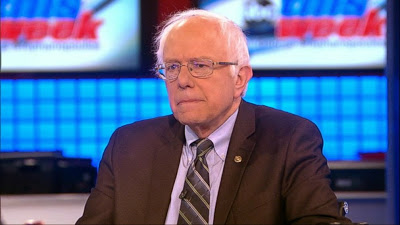Presidential candidate
Bernie Sanders made news over the weekend when he said in a nationally
televised interview that he wants the United States to be more like the
Scandinavian countries – Sweden, Norway, Finland and Denmark.
The Vermont senator, when
it was suggested that Republicans would use that as an attack line, did not
back down an inch from the idea that these Nordic nations represent the type of
democratic socialism that he professes.
I suspect that if he had
more air time during the interview, broadcast by ABC News’ “This Week,” Sanders would
have pointed out that the populace in these small, tight-knit countries
consistently rate among the happiest in the world. Surveys conducted by Gallup
using a variety of measures routinely show the people of the four
Scandinavian countries all rank among the top eight in the world based on
contentment with their living conditions. (The U.S. is usually near the bottom
of the Top 20.)
running for the White House as a Democrat, advocates changes that are contrary
to American norms and traditions. But that doesn’t mean he is foolishly fawning
over failed European states.
Many lists show
the Scandinavian countries among the best in the world in key categories: K-12
education, good wages, low crime, low poverty, health care benefits and paid
leave, and overall quality in government services.
American critics say these
nations represent European-style socialism, they have ridiculously high taxes,
they lack innovation and entrepreneurship. Sure, Americans would never accept
the way people live in Finland. But it’s important to note that these nations
also routinely end up near the top of another list – among the 25 richest countries in the world, based on GDP per capita.
ABC’s George Stephanopoulos about the socialist label:
“Well, so long as we know what democratic-socialism is. And if we
know that in countries in Scandinavia—like Denmark, Norway, Sweden—they are
very democratic countries, obviously. The voter turnout is a lot higher than it
is in the United States. In those countries, health care is a right of all
people. In those countries, college education, graduate school is free. In
those countries, retirement benefits, child care are stronger than in the U-S
of A. And in those countries, by and large, government works for ordinary
people and the middle class rather than, as is the case right now in our
country, for the billionaire class.”
I can hear the Republican attack ad right now: “He wants America to look
more like Scandinavia.”
What’s wrong when you have more income and wealth equality? What’s wrong when
they have a stronger middle class in many ways than we do, a higher minimum
wage than we do, and they’re stronger on the environment than we do? Look, the
fact of the matter is we do a lot in our country which is good. But we can
learn from other countries.”
are willing to spend about half of the money they earn on personal items and
about half on government programs that collectively provide public services.
Jonathan Cohn, who writes for several publications, recently explained the cultural differences this way:
government ownership of business. A candidate or a party (in the U.S) seemingly
calling for that would alienate most of the public — even in a lefty, earthy-crunchy
state like Vermont.
“But that’s not the agenda Sanders has actually been promoting. Sanders doesn’t
shrink from the label socialist … but he generally identifies himself as a democratic
socialist. The distinction matters.
“Democratic socialism, as generally conceived in the U.S.,
is a milder, more aspirational form of the ideology. Democratic socialists
might not recoil at the thought of government running large industries, but
they don’t actively pursue that goal. Instead, they focus on decidedly less radical
objectives — like making the welfare state more generous, giving workers more
power, limiting the influence of money on politics, and policing the practices
of business more closely.”
whether Sanders will catch fire, to some extent, in the Democratic primaries as
a populist who strikes a chord with many disillusioned voters, or if he will simply push
Hillary Clinton further to the left and make her unelectable in November 2016.






